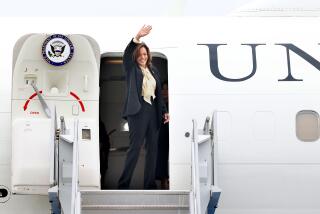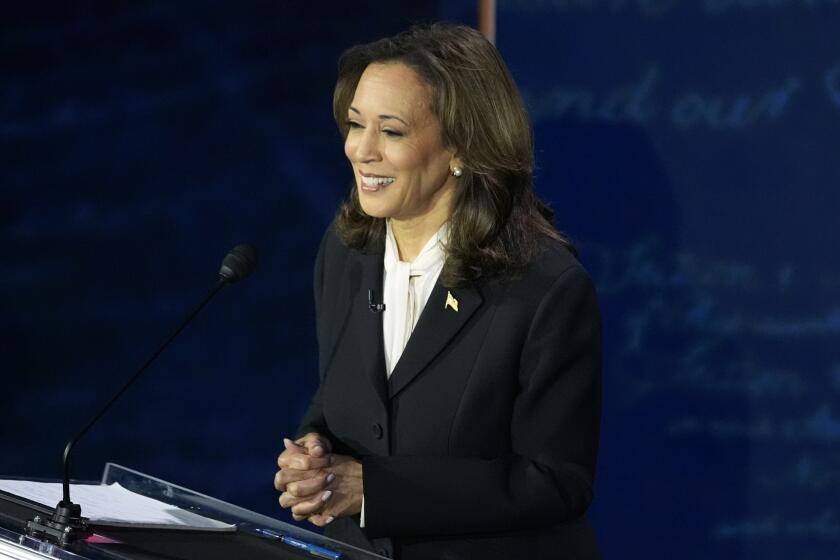A Tight One for Secretary of State
The secretary of state contest typically attracts sparse media coverage, scant financial resources and little voter interest. This year is no different; nevertheless, it is shaping up to be one of the most competitive statewide races on the November ballot.
Incumbent Bruce McPherson and his challenger, termed-out state Sen. Debra Bowen of Marina del Rey, are in a virtual dead heat among likely voters, recent polls show.
At first blush, they appear similar -- two respected politicians with long tenures in the state Legislature, where they showed a keen interest in the state’s electoral system. They support many of the same principles, such as making the office nonpartisan and pressing for campaign finance reform. But they disagree sharply on whether the state’s elections are run properly, and particularly on the trustworthiness of electronic voting machines.
Voting advocates say that whoever is elected will play a vital role in the future of the state’s and the nation’s elections.
“California has provided a lot of leadership for the nation in the area of voting-technology reform,” said Kim Alexander, president and founder of the California Voter Foundation, which does not endorse candidates. “Secretary of State McPherson has provided that leadership; Debra Bowen has provided that leadership in her role on the Senate Elections Committee.”
Elections across the nation have come under heightened scrutiny in recent years, following the 2000 presidential recount in Florida and the increased use of electronic voting. In California, the 2005 resignation of the last elected secretary of state, Democrat Kevin Shelley -- amid investigations into campaign fundraising and his office’s use of federal election money -- also amplified attention on the office.
Gov. Arnold Schwarzenegger appointed McPherson to replace Shelley, and he was unanimously confirmed by the Legislature, including Bowen. McPherson, a moderate Republican, spent 11 years in the state Senate and Assembly. Previously, he worked as a reporter and then editor of his family’s newspaper, the Santa Cruz Sentinel.
McPherson said voters ought to consider his 18-month record. He said he inherited a poorly run office with hostile relationships with election officials in the state’s 58 counties and $150-million in frozen federal funding -- and turned it into an efficient, well-organized agency that is viewed as a model by federal officials. In the Legislature, he was author of bills requiring political candidates to disclose financial contributions online, allowing high school students to work at the polls on election day and studying the effectiveness of the Political Reform Act.
“I’m running on a record of accomplishments,” he said.
McPherson proposes reforming redistricting through an independent, bipartisan committee; enhancing the online campaign finance disclosure system to make it more accessible; requiring that all political contributions be reported online within 24 hours; banning legislative fundraising during the last month of the session and gubernatorial fundraising during the bill-signing period; and reforming the initiative process so that voters are not overwhelmed by a tidal wave of ballot measures.
One of McPherson’s highest priorities is implementing the Help America Vote Act of 2002, a federal measure to help municipalities replace punch-card and lever voting machines with electronic machines that ensure disabled voters’ ability to cast ballots independently.
Since his appointment, he has certified five types of electronic voting machines as having ample safeguards for the state’s elections.
He noted that the machines worked successfully in last November’s special election and the June primary.
“The biggest difference of opinion I have with Debra is that she doesn’t trust the systems, and I do,” he said.
Bowen, who has represented the South Bay in the state Legislature since 1992, readily agrees.
“The secretary of state believes [electronic voting machines] are fine,” she said. “The American public disagrees.”
She said she had been “disappointed” in McPherson’s performance, particularly what she views as a cozy relationship with voting-machine manufacturers and the Bush administration. If she could revisit his confirmation hearing, Bowen said, she would no longer vote to support him.
“He hasn’t been an innovator; he’s been a caretaker,” she said. “He’s taken the word of the voting machine vendors ... rather than what’s good for California citizens.”
Bowen argues that the machines are far from foolproof, noting that a Princeton University professor and his students testing voting machines recently broke into a Diebold device using a readily available key that is typically used with locks on office furniture, jukeboxes and hotel minibars. If elected, she says, she would require random audits of machines on election day and order a full-scale review of all machines in public use.
“Any system that doesn’t have security standards and doesn’t allow disabled voters to cast ballots independently, we won’t use,” Bowen said.
She acknowledged that such a move could mean that some counties have spent millions on equipment that they may not be able to ultimately use.
“It’s unfortunate,” she said. But “democracy is too important. The integrity of elections is too important.”
Bowen also supports public financing of political campaigns to reduce politicians’ reliance on fundraising, and increased disclosure of the financial backers of ballot measures. She also points to her legislative record, including her early embrace of technology as the first state legislator with an e-mail address and co-writing a 1993 bill that put the Legislature’s workings on the Internet.
The closeness of the race stems from the candidates’ positioning: McPherson is a Republican, but he also has received endorsements from traditional Democratic stalwarts such as the California Teachers Assn.
“Most Californians don’t know much about this office, so they’re going to rely on a very, very limited range of cues,” said John Pitney Jr., a government professor at Claremont McKenna College and a former Republican Party official. “Incumbency is one, party is the other, and endorsements is yet another. And if he can get endorsements from traditional Democratic groups, he has a real chance of holding onto the job.”
But some Democratic analysts note that Bowen is a strong candidate with extensive knowledge of the state’s election process and is the only woman from the two major parties on the ballot for a state constitutional office. “If she has enough money to compete on TV in the last week and half or last two weeks, she should do all right,” said Roger Salazar, a California Democratic Party spokesman and consultant.
Bowen has weaker finances than her competitor. She raised $912,436 through Oct. 5 and had $365,156 cash in hand Sept. 30. McPherson had raised nearly $1.8 million through Oct. 4 and had more than $1 million on hand Sept. 30. McPherson said he would begin airing ads this month.
“The problem is: Is Debra Bowen going to have the money for voters to have any idea who she is above and beyond that she’s a Democrat on the ballot?” asked Allan Hoffenblum, a Republican consultant who analyzes state races for the Target Book, an election compendium.
For exclusive Web features, including the new Political Muscle blog, go to latimes.com/californiapolitics.
*
(BEGIN TEXT OF INFOBOX)
Debra Bowen
Party: Democratic
Occupation: State senator
Age: 50; born in Rockford, Ill.
Residence: Marina del Rey
Personal: Married; one foster daughter, one stepdaughter, two grandchildren
Education: Communications degree from Michigan State University, 1976; law degree from University of Virginia, 1979
Career highlights: Assembly, 1992-1998; state Senate, 1998-present
Platform: Review all electronic voting machines used in the state to ensure that they cannot be tampered with on election day; establish stringent monitoring requirements for all voting equipment; improve access to information on political donors and bankrollers of proposed ballot initiatives; increase participation in elections and poll worker training.
*
(BEGIN TEXT OF INFOBOX)
Bruce McPherson
Party: Republican
Occupation: California secretary of state
Age: 62; born in Santa Cruz
Residence: Santa Cruz
Personal: Wife, Mary; two children (one was killed in a robbery in 2001); two grandchildren.
Education: Bachelor’s degree in journalism, Cal Poly San Luis Obispo; honorary degree in humane letters, Cal Poly San Luis Obispo.
Career highlights: Reporter and editor, Santa Cruz Sentinel, 1966-1991; state Assembly, 1993-1996; state Senate, 1996-2004; secretary of state, March 2005-present.
Platform: Implementing the federal Help America Vote Act to ensure that disabled voters can independently cast ballots; reforming the redistricting process through creation of an independent, bipartisan committee; enhancing the online campaign-finance disclosure system to make it more accessible; banning legislative fundraising during the last month of the session and gubernatorial fundraising during the bill-signing period; and reforming the initiative process so voters are not overwhelmed by a tidal wave of ballot measures.
More to Read
Get the L.A. Times Politics newsletter
Deeply reported insights into legislation, politics and policy from Sacramento, Washington and beyond. In your inbox three times per week.
You may occasionally receive promotional content from the Los Angeles Times.











